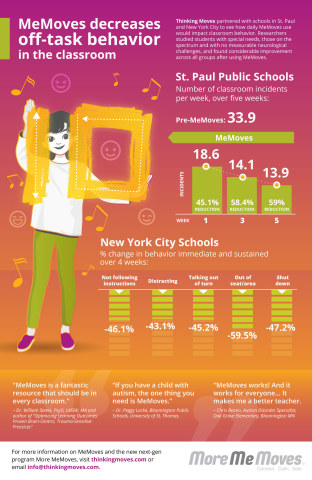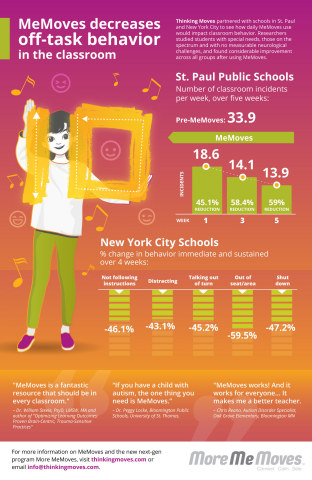HUDSON, Wis.--(BUSINESS WIRE)--Seven years after the introduction of its innovative MeMoves program, Thinking Moves today introduced a new tool, MoreMeMoves, designed to complement and expand upon the original program currently in use in more than 5,000 school districts across the United States and Canada. The company also released new research conducted in New York City and St. Paul, Minn. public schools that demonstrates MeMoves’ effectiveness in the classroom setting – specifically in reducing off-task behavior by 54 percent on average.
MeMoves is a multimedia program for self-calming and neurological healing for anyone with a compromised nervous system. It has been proven effective for those with special needs or those who are challenged by conditions such as autism, anxiety, ADD, depression and physical or emotional trauma. Unlike other therapies or treatments, MeMoves makes an impact in just three to five minutes, is easy to use and requires no training or certification, it requires no classroom reconfiguration or prep, and it can be used in any location with equal effectiveness – including homes, schools, medical settings or on the go.
“We know that in order to learn new things and navigate socially through the world, our nervous system must be calm and alert,” said Thinking Moves Co-Creator Roberta Scherf. “This only happens when we feel safe and connected to other people. MeMoves and now MoreMeMoves are designed to fully engage the individual and help a person or classroom become present and calm.”
MoreMeMoves builds on what parents, teachers, and healthcare professionals already know and love about the original program – it has new music, new movements and dozens of new smiling faces ready to greet individuals and classrooms. The new program is available starting Sept. 18 and can be purchased as a DVD or digital download for home use, or a digital license or USB for classroom and healthcare use.
Thinking Moves recently partnered with schools in St. Paul and New York City to measure how MeMoves’ use would impact classroom behavior. Researchers studied students with special needs, those on the spectrum, and those with no measurable neurological challenges, and found considerable improvement across all groups after using MeMoves.
In St. Paul Public Schools, using MeMoves daily for three to five minutes per day reduced the number of classroom incidents per week, over five weeks of consistent use:
- Pre-MeMoves: 33.9 incidents
- MeMoves week 1: 18.6 (45.1 percent reduction)
- MeMoves week 3: 14.1 (58.4 percent reduction)
- MeMoves week 5: 13.9 (59 percent reduction)
In New York City Schools, daily use of MeMoves revealed a drop in several types of classroom incidents over four weeks of consistent use.
- Out of seat/area: -59.5 percent
- Shut down: -47.2 percent
- Not following instructions: -46.1 percent
- Talking out of turn: -45.2 percent
- Distracting: -43.1 percent
“We knew that MeMoves is an effective classroom management tool and helps create a more productive learning environment, but even we were surprised to see the dramatic drop in off-task behaviors in the St. Paul and New York City school studies,” said Thinking Moves COO Chandra Torgerson, MS, BSN, RN. “This impacts not only students’ ability to learn, but teachers’ ability to teach and their overall satisfaction.” In fact, the results spoke so clearly to administrators that St. Paul Public Schools now use MeMoves in multiple schools across the district.
Thinking Moves plans to conduct additional research in late 2017 and in 2018, examining MeMoves’ effectiveness in additional school districts and with other populations.
About Thinking Moves
Thinking Moves creates innovative tools for self-regulation such as MeMoves, MoreMeMoves and LifeMoves. The company was borne out of Roberta Scherf’s experience with PTSD, as well as raising a child on the autism spectrum. Frustrated with the lack of options in the educational and healthcare systems, she immersed herself in neuroscience literature and explored “out of the box ideas,” bringing together several disciplines to create the precursor to MeMoves. Roberta believed she had a program that could help others, and in 2006, she and Chris Bye founded Thinking Moves. Today, MeMoves is used in schools, homes and medical centers across the world. Based in Hudson, Wisc., the Thinking Moves team is dedicated to helping people struggling with mental and behavioral challenges through the development and advancement of innovative programs that provide neurological healing.




